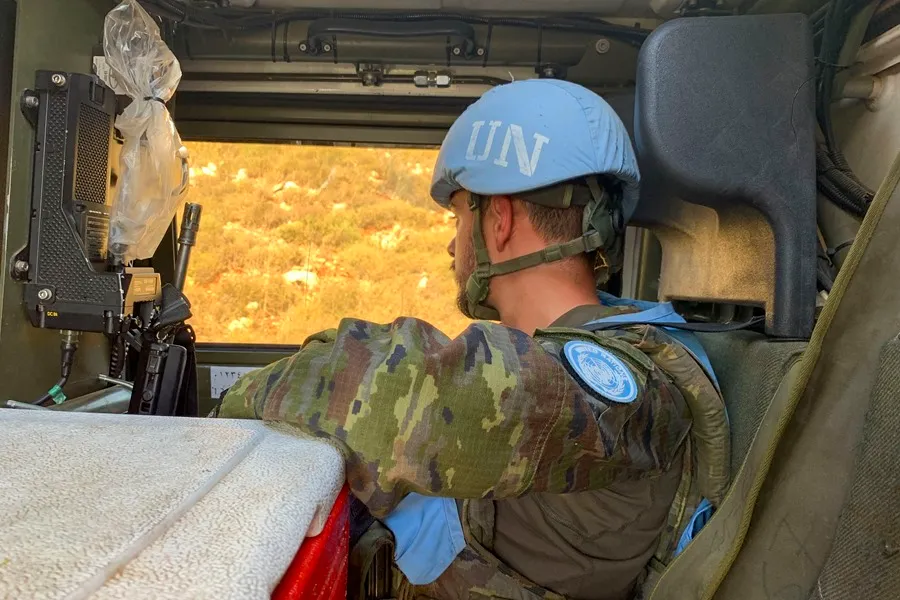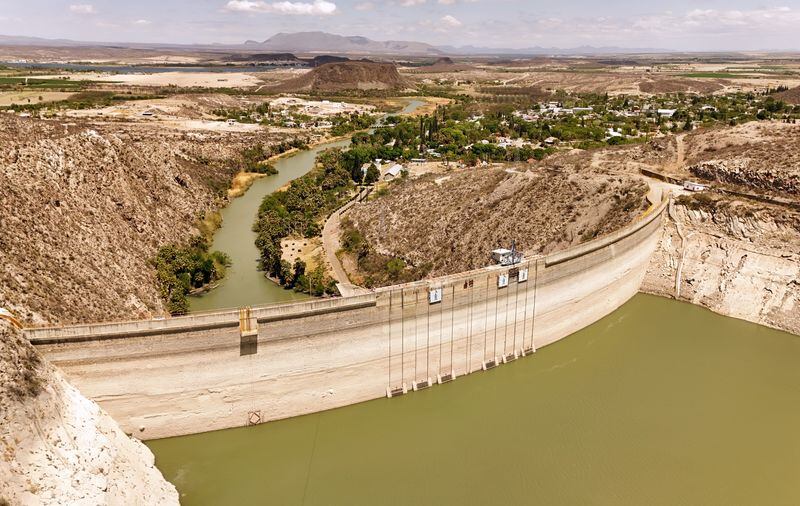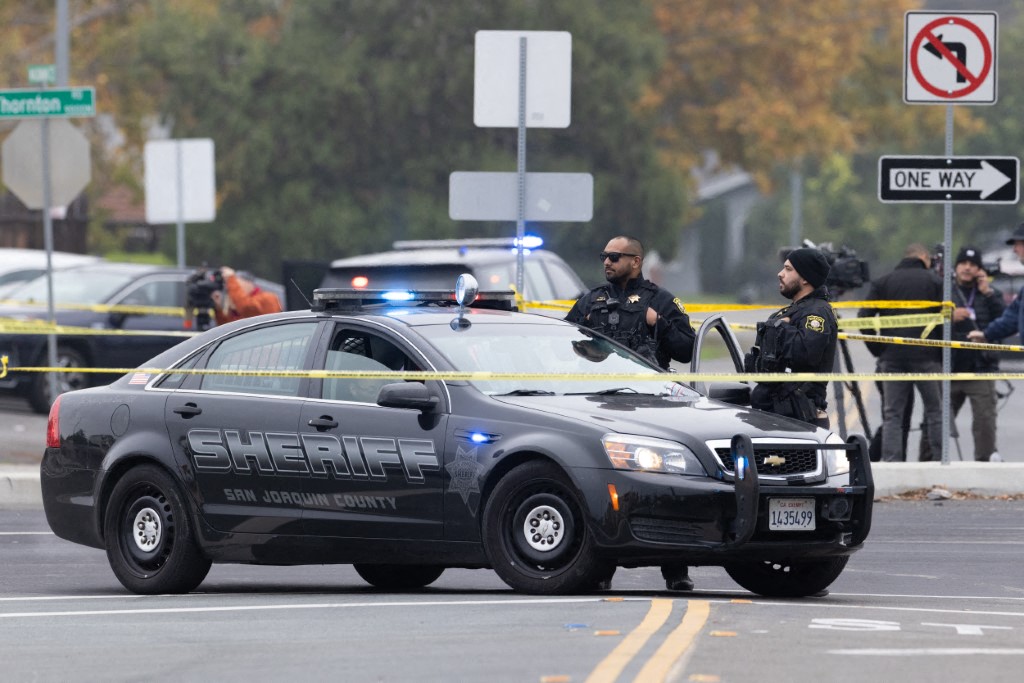International
On Lebanon’s line of fire, Spanish troops patrol between alerts and destruction

Early in the morning of what would be one of the most intense days in eight months of hostilities between the Lebanese Shiite group Hizbulá and the Israeli forces, a patrol of Spanish blue helmets receives the warning that a level 2 alert has been activated.
As mandated by the protocol, the group immediately goes to the position of the nearest UN peace mission in Lebanon (FINUL), something that they have to do quite often in the midst of the escalation that since October has hit their area of operations in the south of the Mediterranean country.
Another Spanish patrol arrives to take refuge at the same base, less than two kilometers from the border with Israel, where the hours go by while from the heliport you can observe in the distance the smoke of some impact on the mountain.
From time to time, you can hear the buzzing of the drones or a few distant explosions. “Another greeting,” jokes one of the military.
Well into the afternoon, eight hours after its activation, the alert that weighed on the entire East sector is lifted and the blue helmets can finally leave the facilities to continue their activities.
According to them, it was by far the most prolonged alert of that type since they arrived in Lebanon last month, when the last rotation of Spanish troops took place.
During the wait on Wednesday morning, the Israeli Army announced the arrival of at least 160 rockets to different parts of the north of the country, including the Lower Galilee region, further from the common border where its crossfire with Hizbulah is usually concentrated.
And in the previous hours the Shiite formation had lost an important commander, his loss of higher rank since the beginning of the clashes, which led him to launch a total of 19 attacks throughout the day, many of them of great magnitude, as confirmed in a series of statements.
The head of one of the Spanish patrols that took refuge at the base, Lieutenant Jesús Sánchez Burgos, explained to EFE that the frequency of the alerts does not follow any specific pattern and that “it depends on the day.”
“When we go on patrol we have (…) our area of responsibility divided into security zones, and they activate them depending on the probability of impact on those areas. When it touches level 2 or level 3, we have to welcome the nearest position,” he said.
“In this case, we were on patrol, they have touched level two and we have had to accept position 966, the position of the Serbs,” added the section chief.
Each patrol consists of two vehicles with a boss, driver, shooter and operator in each of them, which try to ensure compliance with UN Security Council resolution 1701, which ended the 2006 war between Israel and Hizbulah.
“Our mission here is to monitor the cessation of hostilities between the two States, support the Lebanese Armed Forces (LAF) and we are patrolling for that (…) But the situation right now is a little complicated, so that surveillance of that cessation is a little more complicated,” Sánchez acknowledged.
Before the alert was activated, the group that EFE joined was able to develop part of its patrol through the de facto divide between the two countries, also passing through ghost towns dotted with destroyed houses or businesses, and mountains of debris, such as Kafr Kila.
In other areas of the Spanish area of operations, such as the so-called “Christian corredor”, life “is normal” and a good part of the population continues in the area despite the outsping of violence, the lieutenant explained.
In southern Lebanon, about 700 Spanish soldiers are deployed, the vast majority in this contingent part of the Eastern sector, with a total of 3,500 blue helmets of different nationalities.
Its spokesman, Lieutenant Colonel José Irisarri Antón, told EFE that the forces keep a count of the security incidents, recording the type of projectile, the weapon used and the estimate of the damage caused.
But he recalled that the main objective of the patrols is to comply with resolution 1701, that is, “to try that there are no militias or armed personnel in the area that does not belong to the Lebanese Armed Forces,” in his words.
In this sense, the lieutenant colonel stressed that, in fact, they try to make about 25% of their patrols joint with the troops of Lebanon.
“In case we locate something that may involve a missile or mortar launch point, the LAF is informed, they are responsible for controlling that there is nothing and if there is something to seize it, and then destroy it,” he concluded.
International
Police investigate deaths of Rob Reiner and wife as apparent homicide

The Los Angeles Police Department (LAPD) is investigating the deaths of Hollywood actor and filmmaker Rob Reinerand his wife as an “apparent homicide,” amid a wave of tributes to the director of classics such as When Harry Met Sally.
According to U.S. media reports on Sunday, Rob Reiner and Michele Singer Reiner were found dead at their Los Angeles mansion with what appeared to be stab wounds.
Several political figures shared messages of condolence following the reported deaths of the director of A Few Good Menand his wife.
While the LAPD did not officially confirm the identities of the victims, it stated that homicide detectives were dispatched to the Reiner residence.
“At this time, no additional details are available and the investigation into an apparent homicide is ongoing,” the Los Angeles Police Department said in a statement posted on social media.
LAPD Deputy Chief Alan Hamilton told reporters that no arrests have been made and that no individuals are currently being questioned as suspects.
“I’m not going to confirm whether anyone is being questioned at this moment or not. We are going to try to speak with as many family members as we can,” Hamilton said.
CNN reported that a family spokesperson confirmed the deaths of Reiner and his wife.
California Governor Gavin Newsom, former U.S. President Barack Obama, and former Vice President Kamala Harrisissued statements expressing their condolences.
International
U.S. and Mexico Reach Deal to Address Water Deficit Under 1944 Treaty

The United States and Mexico have reached an agreement to comply with current water obligations affecting U.S. farmers and ranchers and for Mexico to cover its water deficit to Texas under the 1944 Water Treaty, the U.S. Department of Agriculture said in a statement.
The department уточified that the agreement applies to both the current cycle and the water deficit from the previous cycle.
On Monday, U.S. President Donald Trump accused Mexico of failing to comply with the water-sharing treaty between the two countries, which requires the United States to deliver 1.85 billion cubic meters of water from the Colorado River, while Mexico must supply 432 million cubic meters from the Rio Grande.
Mexico is behind on its commitments. According to Washington, the country has accumulated a deficit of more than one billion cubic meters of water over the past five years.
“This violation is severely harming our beautiful crops and our livestock in Texas,” Trump wrote on Monday.
The Department of Agriculture said on Friday that Mexico had agreed to supply 250 million cubic meters of water starting next week and to work toward closing the shortfall.
Agriculture Secretary Brooke Rollins, quoted in the statement, said Mexico delivered more water in a single year than it had over the previous four years combined.
Trump has said that if Mexico continues to fall short of its obligations, the United States reserves the right to impose 5% tariffs on imported Mexican products.
Mexico’s Deputy Foreign Minister for North America, Roberto Velasco, said that a severe drought in 2022 and 2023prevented the country from meeting its commitments.
International
Several people shot in attack on Brown University campus

Several people were shot on Saturday in an attack on the campus of Brown University, in the northeastern United States, local police reported.
“Shelter in place and avoid the area until further notice,” the Providence Police Department urged in a post on X. Brown University is located in Providence, the capital of the state of Rhode Island.
U.S. President Donald Trump said on his social media platform Truth Social that he had been briefed on the situation and that the FBI was on the scene.
At 5:52 p.m. local time (11:52 p.m. GMT), Brown University said the situation was still “ongoing” and instructed students to remain sheltered until further notice.
After initially stating that the suspect had been taken into custody, Trump later posted a second message clarifying that local police had walked back that information. “The suspect has NOT been apprehended,” the U.S. president said.
-

 International4 days ago
International4 days agoWashington declares State of Emergency as atmospheric river brings severe flooding
-

 International4 days ago
International4 days agoU.S. to require five-year social media history from tourists under Visa Waiver Program
-

 Central America3 days ago
Central America3 days agoHonduras election crisis deepens as CNE president denounces intimidation attempts
-

 International3 days ago
International3 days agoCuba battles out-of-control dengue and chikungunya epidemic as death toll rises to 44
-

 Central America4 days ago
Central America4 days agoOAS and EU urge honduran political actors to respect vote results and avoid unrest
-

 International3 days ago
International3 days agoColombia says it would not reject Maduro asylum request as regional tensions escalate
-

 International2 days ago
International2 days agoSeveral people shot in attack on Brown University campus
-

 International3 days ago
International3 days agoEcuador on track for record violence as homicides hit highest level in Latin America again
-

 International4 days ago
International4 days agoSix ecuadorian soldiers jailed pending trial for alleged extrajudicial execution
-

 International2 days ago
International2 days agoU.S. and Mexico Reach Deal to Address Water Deficit Under 1944 Treaty
-

 Central America16 hours ago
Central America16 hours agoPanama seizes over three tons of drugs hidden in Caribbean port container
-

 International4 hours ago
International4 hours agoPolice investigate deaths of Rob Reiner and wife as apparent homicide
-

 Central America4 hours ago
Central America4 hours agoOAS urges swift recount in Honduras as election results remain uncertain


























